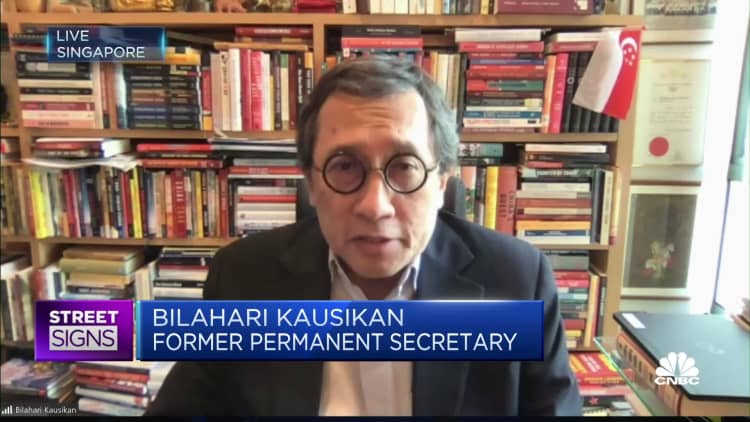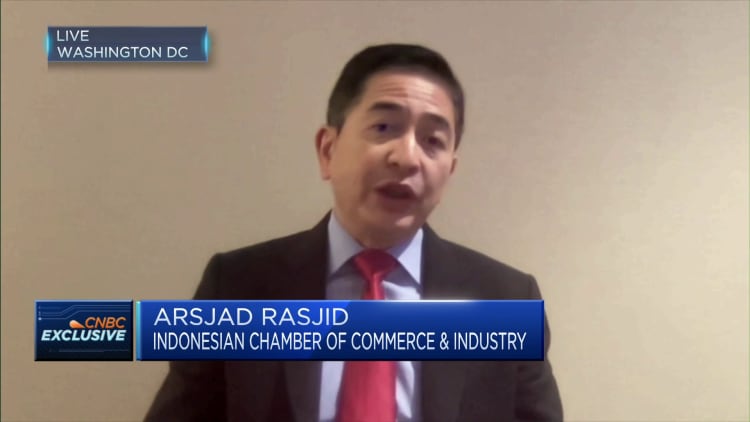
China should consider the West's strong response to the Russian invasion of Ukraine in its own calculations on Taiwan, a former Singaporean diplomat told CNBC on Friday.
"I hope, the major powers in our region, China in particular, have taken note of the very unified and strong Western response and [China] will take that into its calculations vis-a-vis Taiwan, the South China Sea and the Senkaku Islands," Bilahari Kausikan, a former permanent secretary at the Singapore foreign ministry, told CNBC's Street Signs Asia.
China claims self-ruled Taiwan as part of its territory, even though the island has been governed independently of China since 1949.
Beijing also has a number of territorial disputes with its neighbors in the South China Sea, including with Malaysia, Brunei, Indonesia, the Philippines, Taiwan, and Vietnam. China also claims the Senkaku islands — known in the mainland as Diaoyu islands — which are under Japanese control.
The former diplomat was speaking in the context of President Joe Biden's meeting with Southeast Asia's leaders which concludes on Friday.
Speaking about the two-day ASEAN special summit in Washington DC, Kausikan said the meeting was evidence of a "return to normal" for U.S. diplomacy after the "erratic" Trump years.
"Trump was a bit of an aberration because the U.S. has been pretty consistent in engaging Southeast Asia for many decades," said Kausikan, who is now chairman of the Middle East Institute at the National University of Singapore.
He also discounted suggestions that ASEAN is a "tool of the West" in its rivalry with China.
"We are not anybody's tools." he said, referring to the Southeast Asian bloc made up of Brunei, Cambodia, Indonesia, Laos, Malaysia, Myanmar, the Philippines, Singapore, Thailand, and Vietnam.
"We look at China as a means of managing relations with the U.S. and Europe; and we look at Europe and the U.S. as a means of managing our relationship with China," he said, noting that Southeast Asia had been an arena of major power competition for centuries.
I think that's a fantasy. Nobody can decouple from China, not even the United States.Bilahari KausikanFormer Singapore diplomat
He said the timing of the ASEAN summit — where a U.S. trade framework is among the topics expected to be discussed — also proves that the U.S. is not distracted from its focus on the Indo-Pacific.
"Trade is a very sensitive issue in U.S. domestic politics and ASEAN leaders understand that," he said. "In our part of the world, trade is strategy."
U.S.-China 'decoupling'
On U.S.-China rivalry, Kausikan said it is not realistic to expect Western "decoupling" from China, a term which refers to progressively severing economic and trade linkages between China and the West.
The U.S. and Europe are currently trying to reroute supply chains to reduce their dependence on Chinese manufacturing.
"I think that's a fantasy. Nobody can decouple from China, not even the United States," he said, adding that a "partial decoupling" in areas with national security implications could be possible.

The chairman of the Indonesian Chamber of Commerce and Industry, Arsjad Rasjid, told CNBC's Squawk Box Asia, that Indonesia and other ASEAN nations don't want to have to choose sides.
"We want to be friends with the U.S., we want to be friends with China," Rasjid said.
He also acknowledged that "the U.S. has been missing in action," and said the summit marked a new beginning.
On Southeast Asian nations having to choose sides, Kausikan said: "I don't think any of the ASEAN countries see the choice as a simplistic, binary one between the U.S. and China. There is no reason why we should not have good political relations, not just economic relations."
Kausikan said there is a growing realization that close relations with China would "compromise autonomy" unless accompanied by close relations with the U.S.

